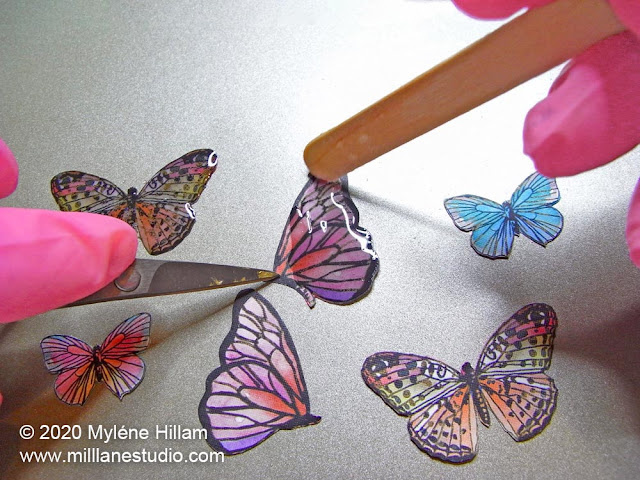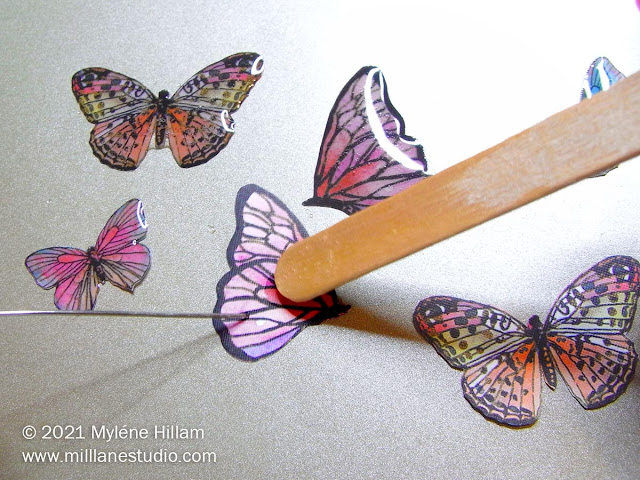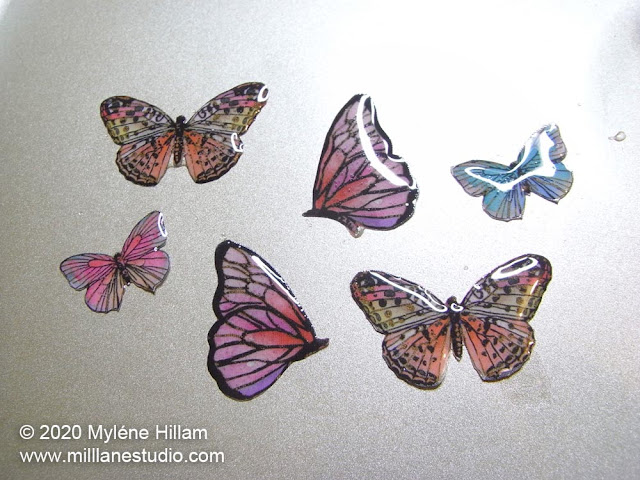Do you have a stash of scrapbook papers with beautiful images?
Have you ever thought of cutting those images out and turning them into wearable works of art?
Or turning them into STICKERS that you can use for cardmaking, journalling and scrapbook projects?
You can create your very own custom jewellery pieces that will make heads turn and hearts flutter. Imagine wearing a pendant made from a vibrant paper pattern. Or adorning your ears with a kaleidoscope of butterflies sealed in a glossy, protective layer of resin.
With a touch of creativity and a little resin magic, you can turn your scrapbook papers into resin stickers that tell a story in your scrapbooks and personalised one-of-a-kind pieces of jewellery.
So, grab your scissors, choose your pretty paper scraps and let's dive into this tutorial.

For this technique, I used a casting resin. But for an even higher domed effect, choose an epoxy coating resin or a doming resin. These are both thicker than casting resins, but I found that even with epoxy casting resin, I still got a nice dome.
You'll need the following supplies:
- EasyCast Epoxy Casting Resin
- Some scrapbook paper images - These butterflies are gorgeous!
- Scissors (or a hole punch)
- Mod Podge
- Plastic measuring cups with graduated measurements
- Wooden stir sticks
- Nitrile gloves - choose the size for your hands
- Xyron Sticker Maker (optional)
- Paintbrush
Prepare the Images
Use small scissors to cut around your images carefully. You can punch out the images using a hole punch or use a die-cutting machine if you don't like fussy cutting.The next step is sealing the paper and it's optional... but advisable.
If you want your images to retain their vibrancy, you should seal them.
Uncoated papers allow resin to penetrate the fibres of the paper and make both the paper and the printed images look dull and almost translucent. If you don't mind that look, you can skip this step.
 |
| Any of these Mod Podge types are suitable. |
Paint each side of the image with a layer of Mod Podge, paying particular attention to the cut edges. You need to coat the paper thoroughly. Any spots you miss will allow resin into the paper, causing what looks like an oily or wet spot on your image.
Leave the images to dry completely (overnight, if possible) before proceeding.
Place the sealed images on a non-stick surface. I've used a non-stick pan but a Teflon craft sheet such as an appliqué sheet or the Ranger craft mat is also excellent.
Mix the Resin
Mix your resin following the instructions that came in your resin kit. You only need to mix a really small amount, about 5 to 10mls (1 or 2 teaspoons) in total for a project like this.
Some brands of resin tell you the minimum amount of resin to mix. Make sure you mix at least that much, and have some moulds to the side so you can pour the leftover resin into them.
I can never stress this enough, but if the manufacturer says to measure equal quantities, then make sure you measure and mix equal quantities. Don't add extra hardener just to make sure - the resin will cure properly without adding extra hardener. And if the manufacturer says to mix it twice, then mix it twice. Following the instructions will give you great results every time!
Coating the Images with Resin
Now, "paint" the resin in a thin coat across the surface of your images with your stir stick. Try to keep the resin within the cut edges of the image without it pouring over the edge. You can tease it out to the edge with a toothpick.
If you have some overflow, that's OK. That's why you're working on a non-stick surface. When the resin cures, you'll be able to easily peel it off the non-stick surface.
If you're making stickers from them, you don't need to dome them on the back.
And that's it! Once they're fully cured, they're ready to be used in your next project. And the best part about it is that they are both waterproof and durable. They are even tough enough to be used in jewellery. Wouldn't these butterflies look great as earrings?!
If you find that it's too fiddly to coat small images this way, you can resin the paper first and then cut out the images once the resin is cured, but you get the nicer domed look using the first method.
How to Make Resin Stickers
Now that the resin cutouts have cured, it takes just seconds to turn them into stickers!
Place your cutout into the shute of the Xyron sticker maker.
Pull it through from the bottom and tear off the sticker.
Once all your domed resin stickers have adhesive on the back, you can peel away the film and the backing paper, and they're ready to be used as unique embellishments for your cards, scrapbooks and journals.
Making Jewellery from Resined Scrapbook Paper
The resin coating makes the paper both strong and waterproof. Not only does the resin give the images a lovely glossy finish, but it also protects them from damage, so they are great to include in your mixed-media jewellery designs.
Instead of running them through the Sticker Maker, you can glue them directly onto metal jewellery findings like in this necklace. Use a strong metal glue like this one.
The resin images are robust enough that you can also drill holes in them so that you can use jump rings and other jewellery findings to connect them together or to dangle them from earring wires.
I hope you have fun with this idea!
Pin this Tutorial for later!
'Til next time...

If you want to learn how to resin like an expert, sign up for my email list.














These are beautiful!
ReplyDeleteThanks Amy - Mod Podge Rocks!
ReplyDeleteWhat a great piece! I love how the butterfly wings are translucent! They look like they're ready to fly away. Nicely done!
ReplyDeleteThanks Andrew. Nice to have you stop by my blog!
ReplyDeleteGreat tutorial, thanks! And thanks also for linking up at our blog hop. I can't wait to see what you post next month!
ReplyDeleteThese are just awesome Mylene!
ReplyDeleteSo glad I hopped on over!
Have a wonderful weekend.
Thanks Marie. I just hopped on over to your blog too. Thanks for sharing so many great projects for the month.
ReplyDeleteThis comment has been removed by a blog administrator.
ReplyDeleteThanks for sharing my tutorial with your readers. I will check the link out.
DeleteI cant believe that résine epoxy that there are many ways to do, because as I thought it is only for boat fixing it's so amazing.
ReplyDeleteThanks for stopping by Jeff. Yes, gone are the days when resin was restricted to boat building. It seems that there is always something new you can do with epoxy resin these days.
DeleteThis comment has been removed by a blog administrator.
ReplyDeletei really love this. Thanks a lot for sharing such a wonderful ideas. Can't wait to try it
ReplyDeleteI LOVE IT ! just beautiful ! Is resin craft work for outdoors only ? It’s October in Canada now. Getting colder . Can this be done on a desk in my room ?
ReplyDeleteYou can still work with resin inside as long as you have ventilation. I have tips that will help you work with resin in cool weather. Make sure you join my email list to get lots of tips and resin info delivered straight to your inbox: https://page.co/i037xd
Delete